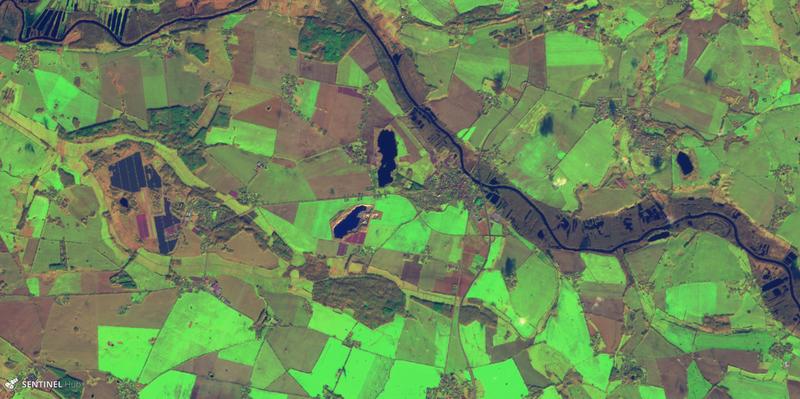

Agricultural landscape in northern Germany in February 2020, image generated from satellite data. Winter wheat grows in the fields: the more intensive the greenery, the more vital the plants are.
Image: Department of Remote Sensing / University of Würzburg
Germany is getting a lot of rain in these days of March. Farmers who want to cultivate their fields are therefore faced with an important question: How wet is it in the fields? Can they be driven over with heavy equipment or is it better to wait and see?
In this case it would be ideal to send a drone with special sensors across the field. And to quickly generate maps from the data obtained, which the farmer can then use on his cell phone or laptop to assess the soil moisture on his fields on a small scale.
Ministry gives 3.7 million euros
This is just one of the scenarios that the new AgriSens research network is working on. Together with farmers, the scientists involved have defined various applications in which digital technologies would be helpful. These include planning irrigation or making harvest forecasts using satellite data.
The starting signal for the network was given by the German Minister of Agriculture, Julia Klöckner, on March 9, 2020 in Berlin: She presented the funding decisions to the project managers. This is because the ministry is supporting AgriSens with 3.7 million euros over the next three years.
Processing and managing huge amounts of data
165,000 euros of this will go to the Remote Sensing Department of Julius-Maximilians-Universität Würzburg (JMU) in Bavaria, Germany. Here, Dr. Christian Hüttich is the project manager: “We are working towards exploiting the full potential of the huge amounts of data coming from Earth observation satellites. We want to create an infrastructure with which these data can be processed as quickly as possible so that they can be used by farmers”.
Some satellites send data to earth once a week, others even daily. It is important to steer this flood of information into the right orbit and combine it with data collected on the ground. Structure and system must be brought into this process.
In doing so, the JMU team is also breaking new ground: “For the first time, we want to bring the remote sensing data into a cloud in which it is also available to all other project participants”, explains Hüttich.
Research and agriculture: The partners in the network
The research association “AgriSens DEMMIN 4.0 (Remote Sensing Technologies for Digitisation in Crop Production)” is coordinated by the GFZ German Research Centre for Geosciences in Potsdam. Other participants are the German Aerospace Center DLR at the locations Neustrelitz, Oberpfaffenhofen and Jena, Julius Kühn Institute Braunschweig, German Weather Service, Martin-Luther-Universität Halle-Wittenberg, Friedrich-Schiller-Universität Jena, Julius-Maximilians-Universität Würzburg and the University of Applied Sciences Neubrandenburg.
Also on board are farms from the Demmin area in the region of Mecklenburg-Western Pomerania and other partner farms in Germany. In Demmin, GFZ and DLR maintain experimental fields where they develop and test new technologies together with farmers.
Creating low-threshold services for farmers
Dr. Daniel Spengler coordinates the AgriSens project at GFZ Potsdam: “Remote sensing data provide rich data treasures that can give farmers important information as a basis for decisions on measures such as fertilisation, sowing or soil cultivation. At present, the hurdle to use these data is unfortunately far too high for many farmers. This applies above all to access to the data, its use in a wide range of software solutions and confusing market offerings. We would like to offer low-threshold solutions here.”
About the person: Dr. Christian Hüttich
Christian Hüttich studied Geography, Geoinformatics and Remote Sensing at the University of Jena. As a PhD student he did research at JMU from 2007 to 2011. Afterwards he worked for seven years again in Jena – at the university and in an aerospace company. He then returned to JMU in 2018. Here he first was a substitute for a professorship for remote sensing, and is currently a research assistant. With the funds from the AgriSens project he can fill another scientific position.
For the JMU project: Dr. Christian Hüttich, Department of Remote Sensing, University of Würzburg, T +49 931 31-82583, christian.huettich@uni-wuerzburg.de
Coordinator of the AgriSens project: Dr. Daniel Spengler, GeoForschungsZentrum GFZ Potsdam, T +49 331 288-1192, daniel.spengler@gfz-potsdam.de
https://www.geographie.uni-wuerzburg.de/en/fernerkundung/persons/dr-christian-hu… Website Dr. Christian Hüttich











